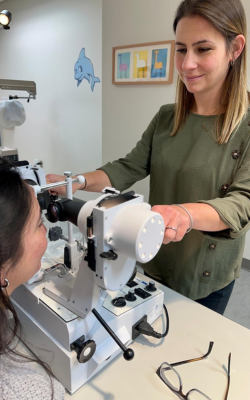Orthoptics is a specialized field within ophthalmology dedicated to the assessment, diagnosis, and non-surgical treatment of eye conditions caused by difficulties in coordinating the two eyes. The term "orthoptics" is derived from the Greek words ortho (meaning straight) and opikos (meaning vision).
What is an Orthoptist?

An Orthoptist is a specialized healthcare professional focused on diagnosing and managing disorders related to binocular vision, eye movement, and eye alignment. They are experts in treating conditions such as amblyopia (lazy eye), strabismus (crossed eyes), and diplopia (double vision). Orthoptists collaborate with pediatric ophthalmologists, strabismus surgeons, and neuro-ophthalmologists to provide comprehensive care for patients of all ages with a range of eye conditions.
At Duke, orthoptists work alongside pediatric ophthalmologists, neuro-ophthalmologists, optometrists, and lead independent clinics, where they treat amblyopia, strabismus, and double vision in both children and adults. Non-surgical treatments include exercises, prisms, occlusion therapy, and binocular digital therapeutics.
The role of an orthoptist is highly rewarding, as they improve patients' vision and overall quality of life, making a significant impact on their daily experiences.

